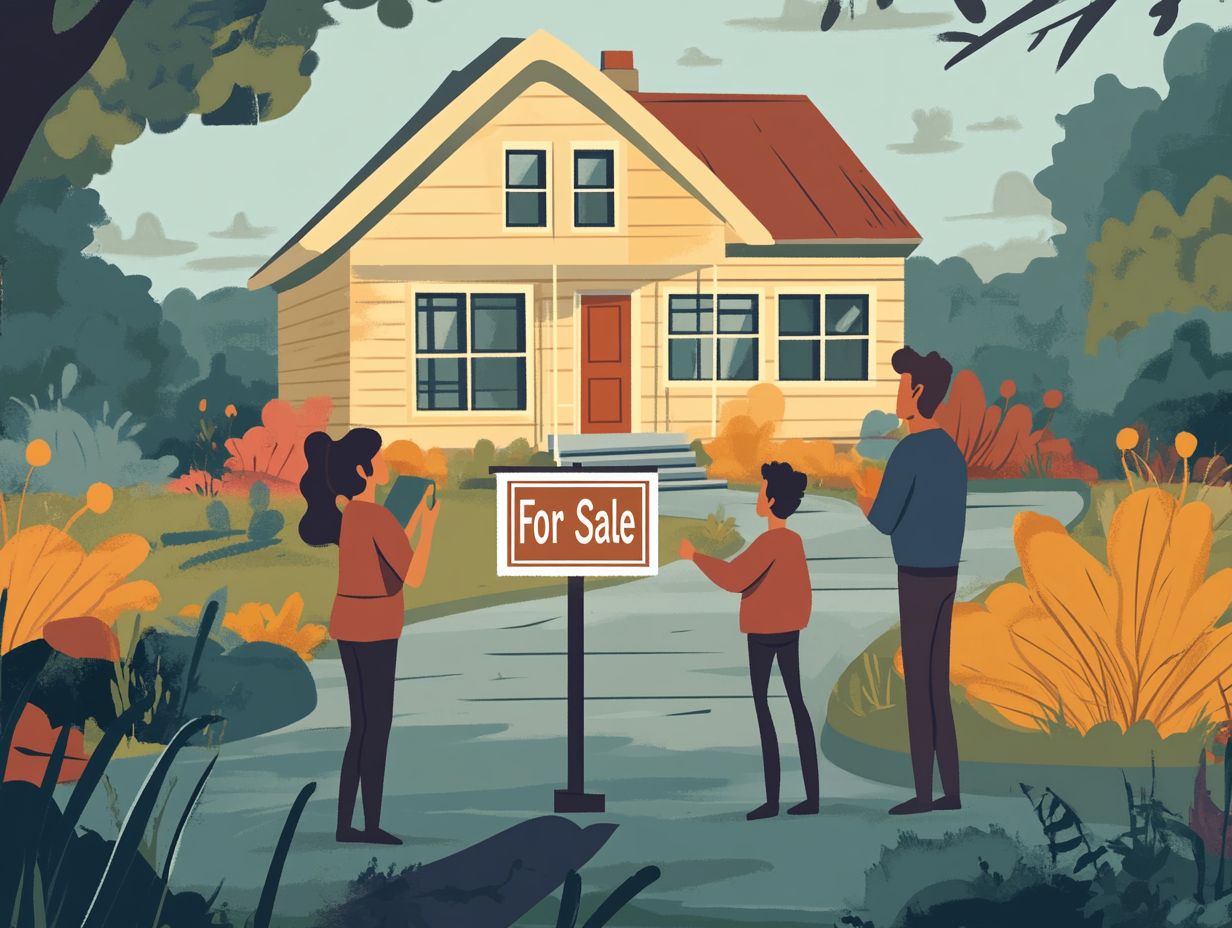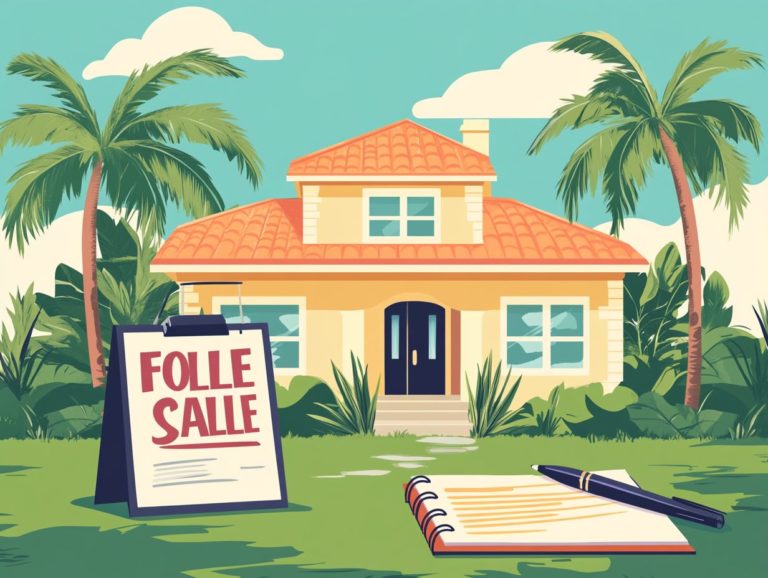6 Tips to Lower Your Home Insurance Premiums
Home insurance can feel like a hefty burden on your wallet, but it doesn t have to leave you financially drained. There are savvy strategies to reduce those premiums while maintaining solid coverage.
Explore six practical tips to help you save money on home insurance, from fine-tuning your deductible to bundling your policies for a discount. You ll also learn how to assess your coverage needs, navigate various types of home insurance, and identify common pitfalls to avoid.
Start now and discover how to make your home insurance more affordable!
Contents
Key Takeaways:
- Increasing your deductible can lower your home insurance premiums.
- Bundling your insurance policies can help you save money.
- Improving your home security can reduce the risk of damage and lower your premiums.

1. Increase Your Deductible
Increasing your deductible is a smart way to save money on home insurance while ensuring strong protection from damage and accidents. By opting for a higher deductible, you can significantly cut down your monthly premium rates, freeing up funds for other home improvements.
However, this decision comes with considerations. You must carefully evaluate the balance between enjoying lower premiums and being prepared for potential out-of-pocket expenses during claims. Insurance companies often set deductible levels based on various risk factors and your claim history, which can influence their pricing models.
Therefore, it’s essential to weigh the financial trade-offs and ensure your deductible aligns with your budget and risk tolerance. Consulting with an insurance agent can provide valuable insights to help you navigate these decisions and discover personalized solutions that offer savings and peace of mind.
2. Bundle Your Insurance Policies
Bundling your home insurance with other policies, like auto or life insurance, can unlock significant savings through multi-policy discounts offered by various insurers. This approach streamlines your billing and paperwork while providing enhanced value and convenience.
Those lower premiums can free up funds for essential needs. By collaborating with a knowledgeable insurance agent, you can navigate the many available bundles and pinpoint the best options for your unique circumstances.
However, it’s crucial to understand the coverage options within each policy to avoid gaps in protection that could lead to unexpected expenses. Many people overlook specific exclusions or the intricacies of claims processes that can affect their policy s performance. So, ask the right questions and stay well-informed.
3. Improve Your Home Security
Enhancing your home security offers more than just peace of mind; it can also lead to lower home insurance premiums. Many insurers reward homeowners who invest in robust security systems with attractive premium discounts.
By taking proactive measures like installing burglar alarms, smoke detectors, and fire alarms you can significantly decrease the risks related to theft and fire damage. These security features act as a deterrent for potential intruders and reduce the likelihood of catastrophic losses that could result in an insurance claim.
You may file fewer claims and build a solid claims history, which insurers tend to view favorably. This enhanced standing can ultimately sway future premium rates in your favor, making it a smart financial choice to invest in improved home security.
4. Make Home Improvements
Making strategic home improvements can greatly elevate your property’s value and safety. You may even discover that incorporating the top 5 home security features that lower insurance can reduce your homeowners’ insurance premiums by lowering the risk of property damage.
By opting for disaster-resistant materials, such as impact-resistant roofing or storm shutters, you can effectively reduce the impact of severe weather. Insurers appreciate this since it signifies a lower risk.
Upgrading aging plumbing or electrical systems not only prevents potentially costly damages from leaks or fires but also creates a safer living environment.
These enhancements contribute to a stronger claims history, showcasing your responsibility and care for your property. They encourage regular reviews of your insurance policies, which can lead to further discounts.
This approach secures you better coverage at lower rates.
5. Review Your Coverage Regularly

Regularly reviewing your homeowners’ insurance coverage is essential to ensure that your policy aligns with your current needs. Take advantage of the best coverage options available for your property.
This practice becomes even more vital as you make improvements to your home or as your claims history shifts. If you decide to renovate your kitchen or add a deck, it s time to adjust those coverage limits.
Emerging risks like flooding or theft in your area can impact whether your existing policies are sufficient.
Consulting with an insurance agent can provide invaluable insights. Fine-tune your policy to better match your evolving circumstances. Don t risk being underinsured or overpaying review your coverage now!
6. Shop Around for Better Rates
Shopping around for better homeowners’ insurance rates can lead to substantial savings. To ensure you’re making the best choice, it’s important to understand how to avoid common home insurance pitfalls. Different insurance companies often present a variety of premium rates, discounts, and coverage options tailored to your unique situation.
This approach helps you find policies that align with your needs and uncovers factors that may affect your costs. When comparing quotes, consider elements like claims history and credit records, as these can significantly impact your premiums.
Take advantage of online tools and resources that streamline this process. This makes it easier for you to evaluate options and make informed decisions to secure the best coverage at an affordable price.
Start comparing today and watch your savings grow!
What Factors Affect Home Insurance Premiums?
Several factors significantly influence your homeowners’ insurance premiums, including your claims history and the financial stability of insurance companies. The location and condition of your home also play a role, as do the type of coverage options you select.
Regional influences are crucial; for instance, if your home is in an area prone to natural disasters like floods or wildfires, you might face higher premiums due to the increased risk. State department regulations may impose extra requirements that could impact your insurance costs, with some states mandating higher minimum coverage levels.
You can take proactive measures to mitigate premium increases by implementing safety features. Installing security systems or utilizing fire-resistant materials can help. Research indicates that homes equipped with these upgrades can reduce insurance costs by as much as 20%, and understanding 7 factors that affect your home insurance premium can further guide your efforts.
By staying informed and taking action, you can navigate the complexities of insuring your property with greater confidence.
How Can a Homeowner Assess Their Insurance Needs?
To assess your insurance needs, evaluate your property and its value. Consider the specific coverage options necessary to shield against potential risks and liabilities.
This process is vital for your peace of mind and ensures you have adequate protection should an unforeseen circumstance arise.
Begin by understanding your insurance policy. Pay close attention to the various terms and conditions relating to coverage limits and exclusions.
Accurately valuing your property is essential. This means considering not only the structure itself but also personal belongings and valuable items that may require additional coverage.
Keep liability protection front and center, as it safeguards against accidents on your property. This provides a critical layer of security.
What Are the Different Types of Home Insurance Coverage?
Homeowners insurance offers various coverage types, including dwelling coverage, personal property coverage, liability protection, and additional living expenses.
Dwelling coverage protects the structure of your home from the roof to the foundation against threats like fire, storm damage, or vandalism. This ensures you can restore your living space after unexpected mishaps.
Personal property coverage shields your belongings inside the home, including electronics, furniture, and clothing, in cases of theft or damage.
Liability protection acts as your safety net against legal claims if someone gets injured on your property. It covers both legal fees and medical expenses.
Additional living expenses coverage helps with temporary accommodation costs if your home becomes uninhabitable due to a covered loss.
Together, these coverage types create a robust safety net, giving you peace of mind as you navigate the uncertainties of homeownership.
What Are Some Ways to Save on Home Insurance Premiums?

Start saving today by following these tips! You can employ several effective strategies, including tips for filing an efficient home insurance claim, to save on insurance premiums.
Shop around for competitive quotes; you d be surprised how much difference a little comparison can make.
Take advantage of premium discounts and improve your home security measures; knowing how to find discounts on home insurance can be game-changers.
Consider increasing your deductibles. This can significantly lower your monthly costs, but ensure you are comfortable managing higher out-of-pocket expenses if a claim arises. A deductible is the amount you pay before your insurance kicks in.
Bundling your insurance policies is another smart move. By combining homeowners and auto insurance, you can unlock multi-policy discounts offered by many providers.
Think about making home improvements. Enhancing your security systems or reinforcing your roof can reduce risks, which often translates to lower premiums. For more tips, check out this guide on how to save on home insurance costs.
Maintaining a good claims history and a solid credit record is crucial, as insurers typically assess these factors when determining your premium rates. This can significantly influence the overall cost of your insurance.
How Can a Homeowner Make Sure They Are Getting the Best Deal?
To secure the best deal on homeowners insurance, regularly shop around, compare quotes from various insurance companies, and evaluate the coverage options available to you.
Engaging in thorough research and consulting multiple insurance agents is essential for understanding the policies on the market.
Since your needs as a homeowner can vary widely, assessing reviews and consumer complaints related to different insurers can provide valuable insights.
When comparing insurance quotes, focus not just on premium costs but also on deductibles, coverage limits, and exclusions. Understanding all the terms and conditions can spare you from unwelcome surprises when it’s time to file a claim.
These steps help you make informed decisions and ensure you re adequately protected.
Common Insurance Mistakes Homeowners Make
Homeowners often make mistakes with their insurance. They may underestimate their coverage needs or overlook important policy details.
These oversights can leave you unprotected during unexpected events. This can lead to financial strain when filing a claim.
Regularly reviewing your coverage is crucial. This helps ensure you include all valuables and any upgrades to your property.
Conduct an annual policy review to find gaps or improve your coverage. Ask questions to clarify your options, and read the fine print carefully.
Keeping your records organized will streamline the claims process. This can make a daunting task more manageable.
Frequently Asked Questions
How Can I Lower My Home Insurance Premiums?
You can lower your premiums by increasing your deductible, bundling policies, improving your credit score, or by learning how to make your home insurance more affordable through additional strategies like installing safety devices.
How Much Can I Save by Increasing My Deductible?

Increasing your deductible can save you 10-30% on your premiums. Remember, you’ll pay this amount out-of-pocket before coverage starts.
Can Bundling Policies Save Me Money?
Yes! Bundling your home and auto insurance often results in discounts. Check with your provider to explore this option.
How Does My Credit Score Affect My Premiums?
Insurance companies often use credit scores to determine your premiums. Understanding the key factors influencing home insurance costs can help you improve your score and potentially lower your home insurance costs.
What Safety Devices Can Help Lower My Premiums?
Installing safety devices like smoke detectors and security systems can lead to discounts. Confirm with your provider which devices qualify.
Is It Worth Shopping Around for Quotes?
Absolutely! Different companies offer various discounts and coverages. Comparing quotes ensures you get the best deal for your insurance needs.





